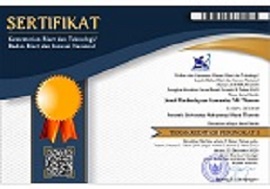Adolescent Knowledge Regarding Nutritional Status Assessment in Budhi Warman 1 High School Students, Jakarta
DOI:
https://doi.org/10.37012/jpkmht.v7i2.2783Abstract
Adequate knowledge of nutritional status assessment among adolescents is crucial, as it can encourage positive lifestyle changes that ultimately aim to improve nutritional status toward a normal or healthy category. This community service program aimed to enhance the knowledge of female students at SMA Budhi Warman 1 Jakarta through education on balanced nutrition, as well as training and hands-on practice in conducting self-assessments of nutritional status using simple measurement methods. The program was implemented in three stages: (1) an educational session focused on the principles of balanced nutrition and the stages of nutritional status assessment; (2) a practical session where participants, guided by facilitators, conducted anthropometric measurements including Body Weight (BW), Height (BH), and Mid-Upper Arm Circumference (MUAC); (3) the assessment of nutritional status using Body Mass Index-for-Age (BMI/A) and MUAC indicators. The program’s effectiveness was evaluated using a pre-test and post-test design to assess changes in participants’ knowledge levels. The evaluation results showed a significant increase in students’ knowledge of nutritional status assessment. The proportion of students achieving a high level of knowledge (>70%) rose from 18.4% in the pre-test to 76.3% in the post-test. Overall, 92.1% of students demonstrated an improvement in knowledge following the intervention. This program demonstrated that a combination of educational sessions and practical training effectively enhances adolescents' knowledge and skills in assessing nutritional status. It is recommended that the school continues this program by empowering trained students to serve as facilitators for subsequent student groups, thereby promoting the sustainability and wider dissemination of this educational initiative.
Downloads
Published
Issue
Section
Citation Check
License
Copyright (c) 2025 Dwi Wahyuni, Petrus Geroda Beda Ama, Yuyun Kurniawati, Dyni Kurniasih, Meisya Nurul Azmi

This work is licensed under a Creative Commons Attribution 4.0 International License.
Jurnal Pemberdayaan Komunitas MH Thamrin allows readers to read, download, copy, distribute, print, search, or link to the full texts of its articles and allow readers to use them for any other lawful purpose. The journal allows the author(s) to hold the copyright without restrictions. Finally, the journal allows the author(s) to retain publishing rights without restrictions Authors are allowed to archive their submitted article in an open access repository Authors are allowed to archive the final published article in an open access repository with an acknowledgment of its initial publication in this journal.

Lisensi Creative Commons Atribusi 4.0 Internasional.













